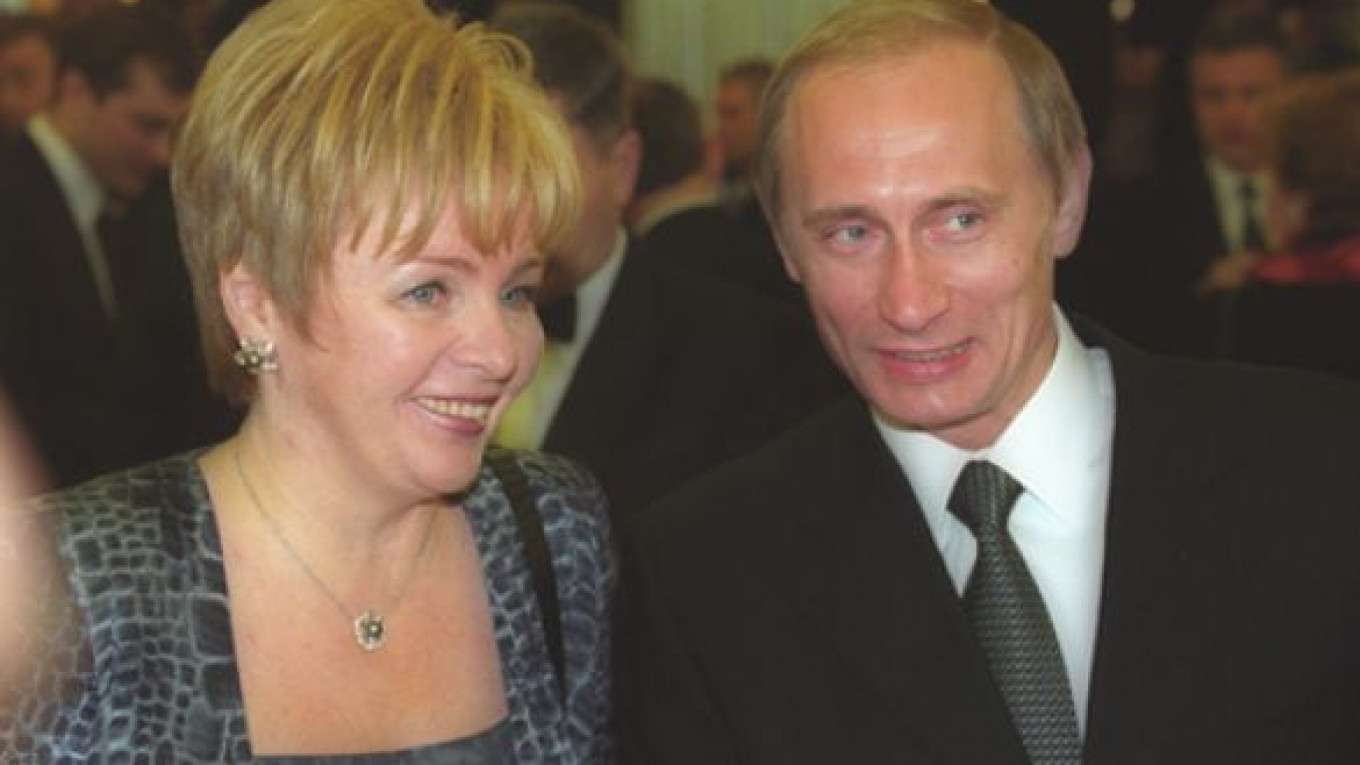Lyudmila Putina once called President Vladimir Putin a vampire, while he in turn has suggested that anyone who could put up with her for three weeks was heroic and deserved a monument.
These and other observations about the private family life of the Putins were detailed in a 2001 book that provided a rare glimpse into a relationship that the Putins abruptly announced Thursday evening had ended in divorce.
The book is titled "Fragile Friendships" and was penned by a German friend, Irene Pietsch, the wife of a Hamburg banker, who became acquainted with the Putins in 1995.
"Unfortunately, he is a vampire," Lyumila Putina said jokingly of her husband, according to the German-language book.
Pietsch also wrote that Lyumila had a fondness for astrology that did not rest well with her husband, who shushed her when she started talking about zodiac signs.
Pietsch said Putina thought highly of truthfulness, but was reprimanded by her husband: "Who cares about your truths." Then Vladimir Putin told Pietsch that she would deserve a monument if she could bear to spend three weeks with Lyudmila.
Putina complained that her husband broke a promise to stay away from the world of spying when he agreed to head the Federal Security Service in July 1998.
"It's terrible," Lyudmila complained in a telephone call that turned out to be the last contact the two women ever had with each other. "We won't be allowed to contact each other again."
"This awful isolation. No more traveling wherever we want to go; no longer able to say whatever we want. I had only just begun to live," she said.
The two women met in 1995 when Vladimir Putin was deputy mayor of St. Petersburg and his family was visiting Hamburg, which has a sister-city relationship with Russia's northern capital.
The future president's family had all learned German while he was a KGB agent stationed in the East German city of Dresden in the 1980s.
In 1996, the Putins visited Hamburg again, even though Putin had lost his job after mentor Anatoly Sobchak was defeated as St. Petersburg mayor.
Pietsch said Lyudmila Putin described her husband as just the right man for her — he didn't drink and he didn't beat her.
However, she fretted about him spending too much time with his friends in the evenings — social gatherings at which she had to serve drinks, gherkins and fish, Pietsch wrote.
Lyudmila also complained about German men rousing their wives early every morning to prepare their husbands' breakfasts because her Volodya started making similar demands after visiting Germany.
When Putin started working as deputy to then-Kremlin property manager Pavel Borodin, the women indulged in an intense correspondence by fax from Putin's Kremlin office.
In 1997, Pietsch and her husband visited the Putins for a week. They stayed at a government dacha in Arkhangelskoye, where Lyudmila cooked soups and Vladimir Putin, wearing a pullover, exuded charm. Pietsch described his blue-green eyes as "two hungry, lurking predators" that he used as weapons. On that particular visit, Putin declared himself in favor of a Russian version of Germany's social democracy, she said.
Lyudmila told her later that her husband "always goes to Finland when he has something important to say. He doesn't think there is anywhere in Russia where you can speak without being overheard."
She also talked of how when she was an Aeroflot flight attendant she had made sandwiches that she sold at a huge profit until the pilot, who was not getting any of the proceeds, stopped her.
Vladimir Putin married Lyudmila Shkrebneva on July 28, 1983. The couple have two adult daughters, Maria, born in 1985, and Yekaterina, who was born a year later.
Lyudmila traveled to Hamburg in 1997 for four days and spent most of her time shopping. Pietsch said Lyudmila was angry that her husband, apparently aware of the uproar over credit cards allegedly issued to the Boris Yeltsin family, had not given her a credit card. "I will never be like Raisa Gorbachev," Lyudmila said.
The women spoke often, talking about sex and God and how to behave in their respective countries. Lyudmila asked whether she should tip shop assistants and whether it was all right to take your own food to a bar.
As for Russian customs, Lyudmila advised: "You must always listen between the words and read between the lines."
Editor's note: A version of this story appeared in The Moscow Times on Feb. 23, 2001.
Related articles:
A Message from The Moscow Times:
Dear readers,
We are facing unprecedented challenges. Russia's Prosecutor General's Office has designated The Moscow Times as an "undesirable" organization, criminalizing our work and putting our staff at risk of prosecution. This follows our earlier unjust labeling as a "foreign agent."
These actions are direct attempts to silence independent journalism in Russia. The authorities claim our work "discredits the decisions of the Russian leadership." We see things differently: we strive to provide accurate, unbiased reporting on Russia.
We, the journalists of The Moscow Times, refuse to be silenced. But to continue our work, we need your help.
Your support, no matter how small, makes a world of difference. If you can, please support us monthly starting from just $2. It's quick to set up, and every contribution makes a significant impact.
By supporting The Moscow Times, you're defending open, independent journalism in the face of repression. Thank you for standing with us.
Remind me later.


